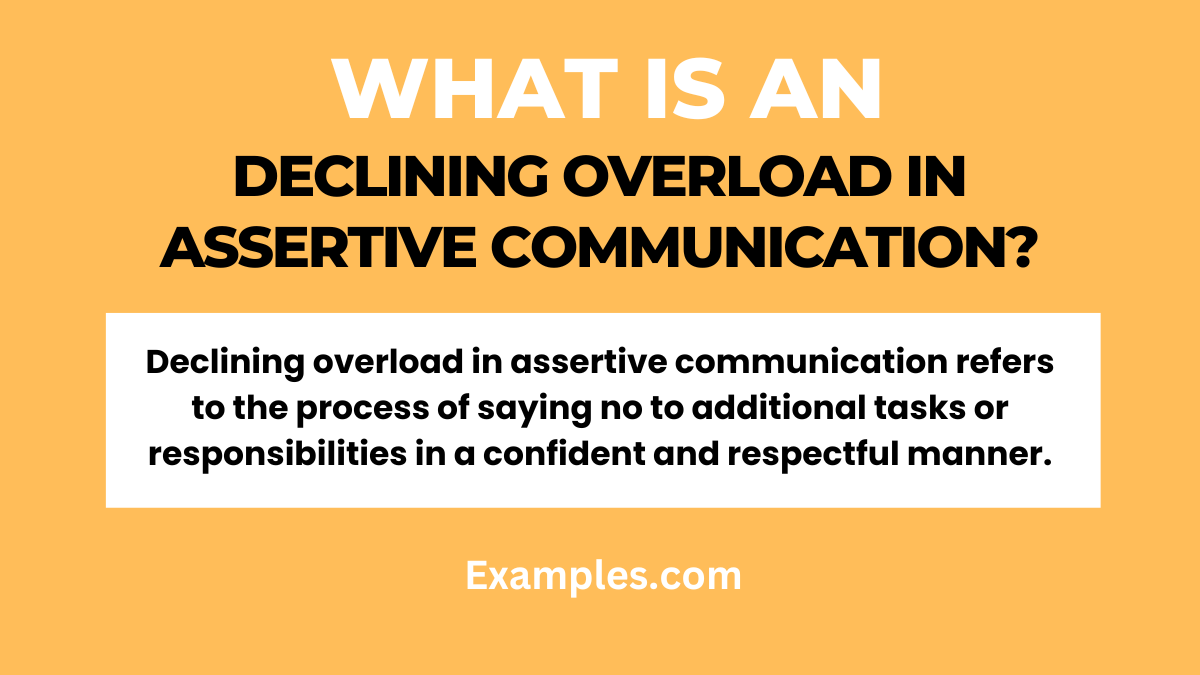19+ Declining Overload in Assertive Communication Examples
In today’s fast-paced world, mastering the art of declining overload in assertive communication is essential. This comprehensive guide provides valuable insights and practical oral communication examples to help you navigate through demanding situations with assertiveness and poise. From the workplace to personal relationships, learn to communicate your boundaries effectively and respectfully. Whether you’re a professional, student, or anyone looking to enhance your communication skills, this guide offers the tools you need for confident and clear expression.
What is Declining Overload in Assertive Communication?

Declining overload in assertive communication refers to the process of saying no to additional tasks or responsibilities in a confident and respectful manner. It involves communicating your limits and boundaries clearly, without being passive or aggressive. This approach allows you to manage your workload effectively while maintaining positive relationships with others. In simple terms, it’s about being able to politely and firmly say no when you can’t or don’t want to take on more work.
20 Examples of Declining Overload in Assertive Communication
In the realm of effective communication, the ability to decline overload assertively is a crucial skill. This guide provides 20 distinctive examples, illustrating how to navigate such situations with finesse and assertiveness. Each example showcases a different scenario, offering insights into the nuanced ways of communicating boundaries. These examples not only serve as practical assertive communication techniques, but also enhance understanding of maintaining professional and personal balance. Ideal for anyone seeking to improve their communication skills, these examples are a valuable resource for handling overload with grace and confidence.
- “Currently, my schedule is fully committed. Could we consider this task for a later date?” Demonstrates a clear communication of current capacity while leaving room for future possibilities.
- “Thank you for the offer, but I must prioritize my existing obligations right now.” Politely declines additional responsibilities, emphasizing commitment to current tasks.
- “I’m honored by your request, however, I’m not in a position to take on more work at this moment.” Expresses gratitude for the opportunity while being honest about current limitations.
- “While I appreciate your trust in my abilities, I need to focus on my current workload to ensure quality.” Acknowledges the offer’s value but prioritizes maintaining a high standard of work.
- “I value our work relationship, but I cannot add more to my plate right now. Let’s revisit this later.” Maintains a positive relationship while setting clear boundaries about current capacity.
- “I’m flattered by your consideration, but I must be mindful of my existing commitments and personal well-being.” Balances professional responsibilities with personal health.
- “Your project sounds interesting, but I’m unable to commit to new tasks at the present.” Shows interest in the project while clearly stating inability to participate.
- “As much as I would like to assist, my current priorities prevent me from taking on additional work.” Expresses a willingness to help but prioritizes current commitments.
- “I must respectfully decline due to my full schedule. Thank you for understanding.” Communicates a full schedule in a respectful and clear manner.
- “I’m committed to delivering quality in my current projects and cannot overextend myself.” Highlights dedication to quality as a reason for not taking on more work.
- “I would not be able to give this new task the attention it deserves due to my current workload.” Focuses on the quality of work and fair attention to tasks.
- “I have to honor my current commitments and personal time, so I cannot accept additional tasks.” Asserts the importance of personal time and existing commitments.
- “Thank you for thinking of me, but I need to concentrate on my ongoing projects right now.” Shows appreciation for the offer while focusing on ongoing projects.
- “Unfortunately, I can’t accommodate this request with my current workload.” Directly communicates current workload constraints.
- “I respect the importance of this, but I must decline to maintain my work quality and health.” Emphasizes maintaining work quality and personal health as priorities.
- “My current priorities require my full focus, so I’m unable to take on additional responsibilities.” Clearly states full engagement with current priorities.
- “While I’m unable to assist with this project, I can recommend someone else who might help.” Offers an alternative solution while declining the request.
- “I’m at my capacity with current projects and need to ensure I meet these commitments fully.” Explains capacity limits and commitment to fulfilling current projects.
- “I appreciate the offer, but I must be careful not to overcommit to maintain effectiveness.” Expresses caution in overcommitting to remain effective in current roles.
- “Regrettably, I have to say no to ensure I don’t compromise the quality of my existing work.” Prioritizes not compromising the quality of current work as a reason to decline.
Steps to Declining Overload in Assertive Communication
Navigating the complexities of workload management requires adeptness in assertive communication. This segment provides key steps to gracefully decline overload, ensuring your message is conveyed with clarity and respect. These steps are crucial for anyone looking to enhance their communication skills in professional and personal spheres. They offer a structured approach to assertively communicate limitations, balancing work responsibilities with personal well-being.

- Assess Your Capacity: Evaluate your current workload and personal commitments before responding. Before agreeing to additional tasks, honestly assess your ability to handle them without compromising quality or well-being.
- Communicate Clearly: Use concise and straightforward language to express your limitations. Articulate your situation clearly, avoiding ambiguity, to ensure your message is understood as intended.
- Offer Alternatives: Suggest other solutions or timelines that might work better for you. Propose alternative ways to contribute or timelines that align better with your capacity.
- Show Empathy: Acknowledge the importance of the request and the person’s needs. Demonstrate understanding of the requester’s situation, showing that your refusal is not a lack of interest or respect.
- Maintain Positivity: Keep a positive tone to foster ongoing good relations. Communicate in a way that maintains and even enhances the relationship, despite declining the request.
- Be Firm but Respectful: Stand your ground respectfully if your decision is challenged. If pushed, reiterate your position with firmness, ensuring your tone remains respectful.
- Offer to Revisit: Propose to reconsider the task at a later, more feasible time. Suggest revisiting the task in the future when you might have more availability.
- Express Gratitude: Thank the person for considering you for the opportunity. Acknowledge the offer with gratitude, showing appreciation for being thought of.
- Provide a Reason: If comfortable, share a brief reason for your decision. Offering a brief explanation can help the requester understand your situation better.
- Follow-Up: Suggest staying in touch for potential future collaboration. Indicate your willingness to remain engaged and consider future opportunities.
Strategies for Managing Overload in Assertive Communication
Effective management of workload through assertive communication is a skill that enhances both professional and personal life. This section outlines strategies to manage overload assertively, promoting a healthy balance between work demands and personal capacity. By adopting these strategies, individuals can improve their communication skills, reduce stress, and maintain positive relationships while setting clear boundaries.

- Prioritize Tasks: Identify which tasks are most urgent and important. Focus on prioritizing tasks based on their urgency and importance, helping manage workload more effectively.
- Set Clear Boundaries: Establish and communicate your limits upfront. Clearly define your boundaries regarding workload and communicate them to others to prevent overload.
- Seek Support: Don’t hesitate to ask for help or delegate tasks when necessary. Recognize when you need assistance and seek support or delegate tasks to manage workload better.
- Practice Self-Care: Ensure you allocate time for rest and personal activities. Prioritize self-care to maintain a healthy balance, which is essential for managing stress and workload.
- Regular Check-Ins: Have frequent check-ins with yourself about your workload. Continually assess your workload and well-being to make adjustments as needed.
- Effective Time Management: Utilize time management techniques to optimize productivity. Apply time management strategies to make the most of your work hours, reducing the risk of overload.
- Assertive Communication Training: Consider training or workshops to enhance assertive communication skills. Engage in training to refine your assertive communication, making it easier to manage and communicate about overload.
- Use Assertive Language: Choose words that are clear, direct, and non-confrontational. Communicate using language that is assertive yet respectful, avoiding any ambiguity.
- Negotiate Workload: If possible, negotiate your workload with supervisors or team members. Discuss and negotiate your workload with relevant parties to find a manageable balance.
- Reflect and Adjust: Regularly reflect on your strategies and adjust as necessary. Continuously evaluate the effectiveness of your strategies and make adjustments to improve your approach to managing workload.
What are the Characteristics of Declining Overload in Assertive Communication?
In the landscape of oral communication, effectively declining overload in assertive communication is an essential skill. It involves a blend of respectfulness, clarity, and firmness. Understanding and embodying the characteristics of this communication style are crucial for managing workloads effectively while maintaining positive interpersonal relationships.
- Clarity: One of the primary characteristics is clarity. In oral communication, it’s important to articulate your message in a straightforward and unambiguous way. Clear communication ensures that the message about your workload and limitations is understood without room for misinterpretation.
- Respectfulness: While declining an additional workload, it’s essential to maintain a respectful tone. This involves acknowledging the importance of the request and showing appreciation for being considered. Respect in communication fosters mutual understanding and maintains healthy relationships.
- Firmness: Firmness is about being assertive in your communication without being aggressive. It involves standing your ground and clearly communicating your inability to take on more tasks. Firmness in oral communication is crucial to effectively convey your decision.
- Empathy: Demonstrating empathy involves understanding and acknowledging the needs or situations of others. Even when declining a request, showing empathy ensures that the other party feels heard and understood, which is vital in oral communication.
- Honesty: Being honest about your reasons for declining additional tasks is key. This might include current workload, personal commitments, or the need to maintain a certain quality of work. Honesty builds trust and credibility in professional and personal interactions.
- Positivity: Maintaining a positive tone, even when declining a request, helps to soften the impact of refusal. Positivity in oral communication can help preserve relationships and leave the door open for future collaborations.
- Conciseness: Effective communication is often concise. It’s about delivering your message in a way that is succinct yet complete, avoiding unnecessary details that might cloud the main point.
- Solution-Oriented: Even when declining a request, it’s helpful to offer alternative solutions or suggestions. This shows a proactive and helpful attitude, which is a valuable trait in oral communication.
- Assertiveness: This is the ability to express your needs and opinions confidently and calmly. Assertive communication involves a balance between aggressiveness and passivity, ensuring that your voice is heard while respecting others.
- Flexibility: While being firm in your decision, showing some degree of flexibility, like offering to revisit the task at a later time, can be beneficial. This demonstrates your willingness to collaborate and find mutually beneficial solutions.



